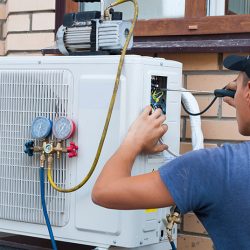Is your home’s electrical system ready to handle the growing demands of the digital age? Even if your home doesn’t have many automated features, it’s almost sure that it was built with an old electrical system dating back to the era of Edison. The good news? You can upgrade that system to make it ready for today’s high-tech home. To do so, you’ll need to enlist the help of an electrical contractor. You will have the knowledge and equipment necessary to perform the required upgrades. Working together, you can create an energy-efficient home, safe and easy to maintain. Here’s everything you need to know about becoming an electrical contractor.
Get Licensed
First and foremost, you’ll need to get licensed by the state or municipality where you intend to work. Electrical contractors in Lewisville, TX are legally defined as electricians who are permitted to install, fix, replace, and maintain electrical systems. To obtain licensure, you’ll need to pass a state licensing exam.
This exam carries the exact requirements that electricians in other trades must meet. For instance, you’ll have to be at least 18 years old and physically able to pass a test that features questions on math, theoretical electrical theory, written exams on electricity law and safety regulations, and practical assessments of your skills. In completing these examinations successfully, you’ll also have to demonstrate competency in operating electric tools safely and keeping up-to-date with necessary industry references.

You can register as an electrical contractor in both cities with no license if you work exclusively for a residential customer. The only requirement is that your customers have already signed a licensing agreement with their electric supplier that lets them use their electrician to install new circuits or equipment for systems not meeting minimum standards established by local code. If necessary, the electrician will be required to complete any additional work above and beyond what is required by local regulation or manufacturer’s recommendations.
Understand The System
As an electrician, you’ll need to know what makes up the electrical system and how it works. A good understanding of the system will help you troubleshoot any problems. For example, you might discover that a faulty circuit breaker or power strip is causing pain with a switch, light, or outlet—understanding how those components work will let you make repairs quickly and efficiently. Become an electrician requires some knowledge about various electrical circuits and devices such as fuse box locations and placement, panel sizes and capacities, and wire colors to keep all critical components of the house’s system organized adequately and working correctly, as well as safety features such as circuit breakers, overload protection, and lighting control switches.




